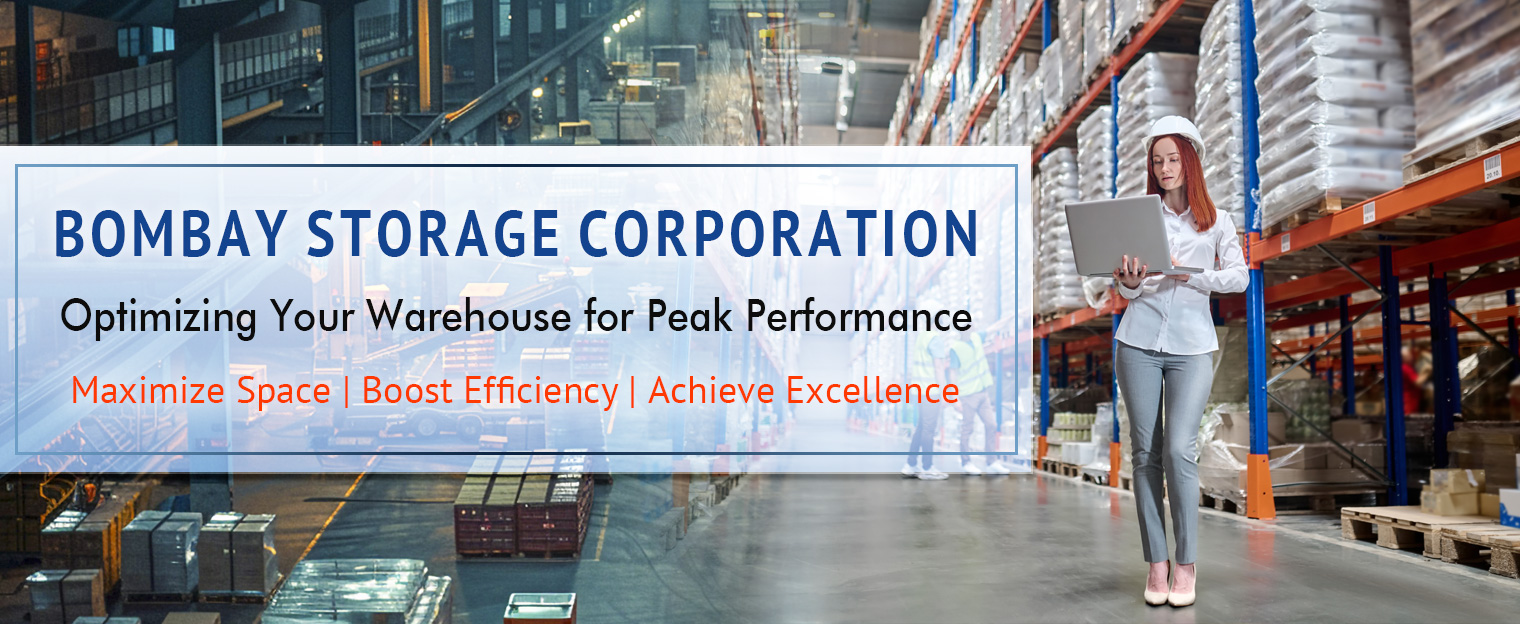
Welcome to Bombay Storage Corporation
At Bombay Storage, we specialize in comprehensive warehouse design and logistics solutions. Whether you’re establishing a new facility or enhancing an existing one, our expert consultants are here to optimize your space for maximum efficiency and long-term success.

Design a New Facility
Our Warehouse and Distribution Centre Design Consultants are dedicated to creating the most suitable and effective warehouse designs from the ground up. This approach ensures your facility’s optimal performance, capacity, and financial benefits throughout its lifecycle.
We collaborate closely with clients, conducting site visits, process walkthroughs, data analysis, and referencing business plans and projections to understand their unique warehousing needs.
Our consultants model a variety of design options, including automation when appropriate, using a proven methodology to determine the best fit for your needs.
We provide detailed capital and operating cost schedules, capacity analyses, and implementation steps based on a thorough cost-benefit analysis.
Our in-house CAD facilities offer detailed scale plan view drawings and 3D representations for clear, precise planning.
At BSC, we ensure smart and excellent project execution. Our process begins with comprehensive planning and detailed understanding of warehousing solutions. Our execution team creates precise blueprints, and components are efficiently transferred to the site. The installation process is meticulous, aiming for complete perfection. After installation, we conduct rigorous testing for load-bearing and safety parameters, ensuring adherence to industry standards. Finally, we provide a thorough quality assurance, certifying the systems before handing them over to the client, guaranteeing full satisfaction and flawless execution
Redesigning an Existing Facility
When it comes to redesigning and repurposing your existing warehouse, our consultants bring extensive experience and expertise to the table. We focus on optimizing your current space to meet your evolving business needs.
- Begin redesign process with a detailed assessment of the existing facility setup.
- Document all pertinent details and identify any existing flaws or inefficiencies.
- Compile findings into a comprehensive report that highlights operational issues.
- Conduct client consultations to understand specific concerns and project goals.
- Develop potential solutions based on client input, including feasibility and cost-benefit analyses.
- Present proposed solutions to the client, refining them interactively based on feedback.
- Ensure that the redesign meets client expectations, improves functionality, and resolves identified issues effectively.
- Conduct Site Visits: Visit client facilities to assess the physical space and current operations.
- Process Walk-Through : Observe and document existing workflows and processes.
- Data Analysis: Analyze operational data to understand throughput, storage needs, and process inefficiencies.
- Business Plan Review: Reference client business plans and projections to align warehousing solutions with future growth and operational goals.
- Modeling Design Options: Use a proven methodology to model various design options, including:
Manual Operations: Evaluate traditional storage and retrieval systems.
Automated Systems: Assess the feasibility and benefits of incorporating automation technologies.
- Solution Fit Analysis: Determine the best fit for the client’s needs based on efficiency, cost, and scalability.
- Cost Schedules: Develop detailed capital and operating cost schedules to provide a clear financial picture.
- Capacity Analysis: Conduct thorough analyses to ensure the design meets current and projected capacity requirements.
- Implementation Steps: Outline a step-by-step implementation plan, including timelines, milestones, and key responsibilities.
- Scale Plan View Drawings: Create detailed 2D CAD drawings to illustrate the proposed layout.
- 3D Representations: Develop 3D visualizations for a more immersive and comprehensive understanding of the design.
- Clear Planning: Use these visual tools to ensure precise planning and to facilitate clear communication with the client.
- Comprehensive planning and detailed understanding of warehousing solutions initiate our process at BSC.
- Our execution team meticulously creates precise blueprints for each project.
- Efficient transfer and meticulous installation ensure high-quality execution.
- Rigorous testing for load-bearing and safety parameters adheres strictly to industry standards.
Other Services
Inventory Management Optimization
Space Utilization and Layout Design
Technology Integration
Technology Integration
Process Improvement
Safety and Compliance
Staff Training and Development
Performance Metrics and KPIs
Optimizing Logistics: Crafting a Strategy for Future-Proof Supply Chains
A robust logistics strategy is critical for businesses delivering physical products, ensuring alignment with overreaching business goals to achieve customer satisfaction and cost-effectiveness. Here are key strategy points to consider
Understanding and anticipating future capacity needs is essential for sustaining growth. A strategic review should address:
- Projected demand over the next five years
- Scalability of existing logistics operations
- Investment in new technologies or facilities to meet future demands
- Flexibility to adjust to market fluctuations and unforeseen disruptions
Effective inventory management balances availability with cost efficiency. Considerations include:
- Determining optimal stock levels to minimize holding costs while avoiding stockouts
- Strategic placement of inventory to reduce lead times and improve service levels
- Implementing advanced inventory management systems for real-time tracking and forecasting
- Assessing vendor-managed inventory (VMI) options to streamline supply chain operations
The location and function of logistics facilities impact delivery speed and operational efficiency. Strategic planning should cover:
- Analysis of current facility performance and future needs
- Geographic distribution to optimize coverage and reduce transportation costs
- Multi-functional facilities that integrate warehousing, distribution, and returns processing
- Evaluating the benefits of centralized versus decentralized facility models
International logistics introduces complexity that requires careful strategic planning. Key aspects include:
- Understanding and complying with international trade regulations and customs procedures
- Managing cross-border transportation logistics and associated costs
- Mitigating risks related to currency fluctuations, tariffs, and trade barriers
- Leveraging trade agreements and international partnerships to optimize supply chain routes and reduce costs
Leveraging technology enhances logistics efficiency and transparency. Focus areas include:
- Implementing advanced transportation management systems (TMS) for route optimization and real-time tracking
- Utilizing warehouse management systems (WMS) to improve inventory accuracy and reduce handling times
- Exploring automation and robotics for warehousing and order fulfilment.
- Investing in data analytics to gain insights into logistics performance and drive continuous improvement
Modern logistics strategies must address environmental impact and sustainability. Strategies include:
- Reducing carbon footprint through optimized routing and energy-efficient transportation modes
- Implementing green packaging solutions and reducing waste
- Partnering with eco-friendly suppliers and logistics providers
- Setting sustainability goals and regularlyreporting on progress
Customer satisfaction hinges on reliable and timely delivery. Key tactics include:
- Developing a responsive and agile logistics network capable of meeting changing customer demands
- Enhancing last-mile delivery options, including same-day or next-day delivery services
- Providing transparent and accurate delivery tracking for customers
- Gathering and analysing customer feedback to continuously improve logistics services
























